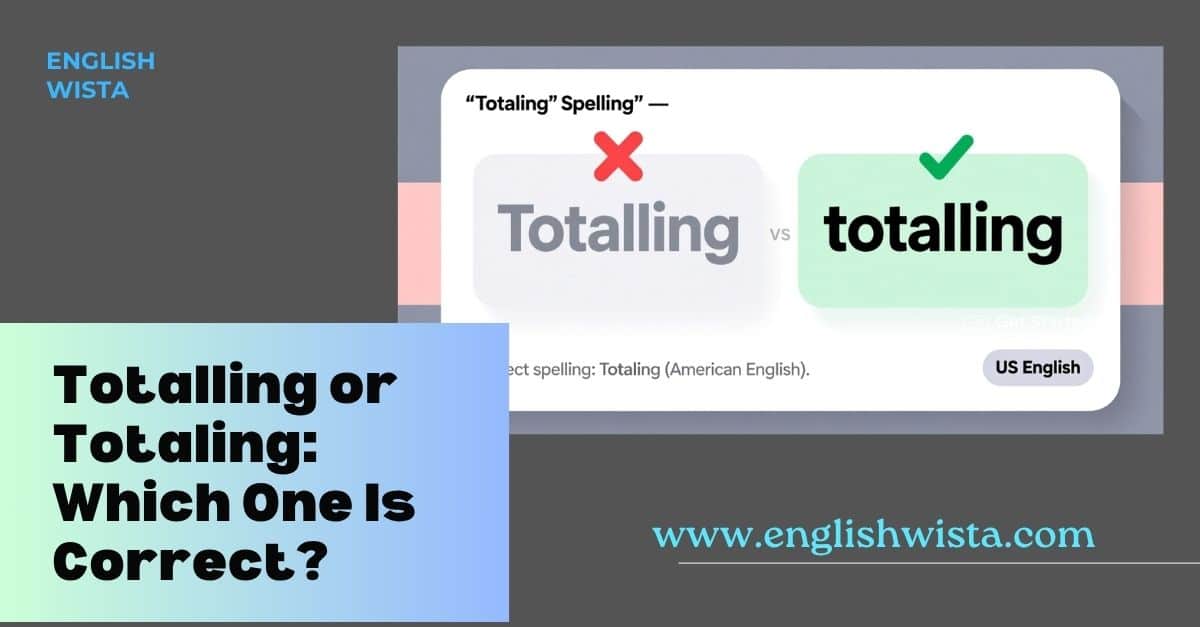A Little Word with a Big Question
Have you ever typed out an email, school essay, or work report and paused over the word totalling or totaling? Maybe spell-check underlined one version, leaving you second-guessing yourself. Don’t worry you’re not alone. This tiny spelling difference has caused confusion for many English learners and even native speakers.
Here’s the good news: both totalling and totaling are correct. The difference simply comes down to where you are in the world. British English and American English each follow their own spelling habits. In this article, we’ll break everything down step by step so you’ll never hesitate again when writing this word.
Let’s take a closer look at what’s going on.
What Does “Totalling/Totaling” Mean?
First things first what does the word even mean?
- Definition: Totalling or totaling comes from the verb to total, which means “to add up numbers or amounts to reach a final sum.”
So when you’re totalling (or totaling), you’re adding things together.
For example:
- “She is totalling the grocery bill.”
- “The damages were totalling thousands of dollars.”
The meaning stays exactly the same no matter how you spell it.
The Core Difference: British English vs. American English
Here’s the simplest way to understand it:
- Totalling = British English (used in the UK, Australia, New Zealand, and other Commonwealth countries).
- Totaling = American English (used in the US and often Canada).
The same word, just different spelling traditions.
Why Do British and American Spellings Differ?
You might be wondering, why does English do this to us? The answer goes back to history and language evolution.
In British English, when a verb ends with a vowel + consonant (like “total”), the final consonant is usually doubled before adding endings such as -ing or -ed. That’s why they write:
- travel → travelling
- cancel → cancelled
- total → totalling
In American English, the rule is looser. Americans often skip doubling the consonant if the last syllable is not stressed. That’s why they write:
- travel → traveling
- cancel → canceled
- total → totaling
So, the difference is not random it’s part of a larger pattern in English spelling.
Which One Should You Use?
This depends on your audience and location.
- If you’re writing for American readers: use totaling.
- If you’re writing for British readers: use totalling.
- If you’re unsure: pick the spelling that matches the rest of your writing.
For example, if you already use “color” instead of “colour” and “organize” instead of “organise,” then stick with totaling to stay consistent.
Real-Life Examples of “Totalling” and “Totaling”
Let’s look at some everyday sentences. You’ll see how the meaning stays the same, no matter the spelling.
British English (totalling):
- “The shop was totalling the sales for the week.”
- “The new project ended up totalling over £2 million in costs.”
- “She kept totalling the points after each round of the quiz.”
American English (totaling):
- “The company is totaling its annual expenses.”
- “The car accident caused damages totaling $15,000.”
- “He was totaling the votes as they came in.”
Notice how both versions sound completely natural, depending on which side of the Atlantic you’re on.
Common Confusions with Doubling Letters
This isn’t the only word that causes spelling confusion. English learners often stumble over similar cases. Let’s compare:
- British: cancelling, travelling, labelling, totalling
- American: canceling, traveling, labeling, totaling
See the pattern? In British spelling, the l gets doubled. In American spelling, it usually doesn’t.
So if you remember this trick, you’ll know exactly when to expect double consonants.
Is “Totalling” or “Totaling” More Common Worldwide?
Thanks to the internet, both spellings appear everywhere. However, search engines and word frequency data show a clear divide:
- Totaling is much more common online overall, simply because American English dominates international media.
- Totalling is still widely used in countries that follow British English.
So if you’re writing for a global audience, don’t stress too much people will understand both.
Fun Fact: The Origin of the Word “Total”
Here’s a little extra nugget of knowledge. The word total comes from the Latin word totus, which means “whole” or “entire.” Over time, it moved into Old French as total and eventually into English.
So when you’re totalling or totaling numbers, you’re literally making them into a “whole.” Pretty neat, right?
Practical Writing Tips for Learners
If you’re a student, business writer, or non-native English speaker, here’s how to avoid mistakes:
- Know your audience. Decide if you’re writing for British or American readers.
- Stay consistent. Don’t mix spellings like “color” and “colour” in the same document.
- Use spell-check. Set your document to British or American English in Word or Google Docs.
- Practice with examples. Write short sentences using both versions until they feel natural.
For example, try this exercise:
- British: “I am totalling my monthly expenses.”
- American: “I am totaling my monthly expenses.”
A Quick Recap with a Simple Rule
Let’s boil it down to one easy-to-remember rule:
- Double the L in British English → totalling
- Single L in American English → totaling
That’s it! If you remember this pattern, you’ll never hesitate again.
Fun Extras: Totals in Everyday Life
To make this topic even more fun, let’s think about where you actually see the word in real life:
- Shopping: Totalling your groceries at checkout.
- Sports: Totalling the final score of a game.
- Work: Totalling monthly reports or budgets.
- Travel: Totalling your expenses from a holiday trip.
The word pops up all the time in daily life, so it’s worth knowing how to spell it correctly.
Frequently Asked Questions
1. Is “totalling” the plural form of “total”?
Nope! “Totalling/totaling” is just the -ing form of the verb to total. The plural of total (as a noun) is simply totals.
2. Can I use “totaling” in the UK?
Technically, yes. People will understand you, but it might look like an Americanism. If you’re writing formally, stick to totalling in the UK.
3. Which one is in the dictionary?
Both! Major dictionaries like Oxford, Cambridge, and Merriam-Webster list the word with both spellings, depending on the region.
Conclusion: Totalling or Totaling Both Are Right!
So, what’s the final takeaway? Whether you write totalling or totaling, you’re not wrong. The difference lies in geography, not meaning.
- British English prefers totalling with a double L.
- American English prefers totaling with a single L.
The most important thing is to stay consistent. If you’re writing for an international audience, don’t worry readers will easily understand both spellings.
Think of it like two different accents: just as people say “tomato” a little differently around the world, they also spell words a little differently. And that’s part of what makes English such a fascinating language.
So next time you’re totalling or totaling your expenses, you can smile knowing you’ve mastered one more quirk of English spelling.



